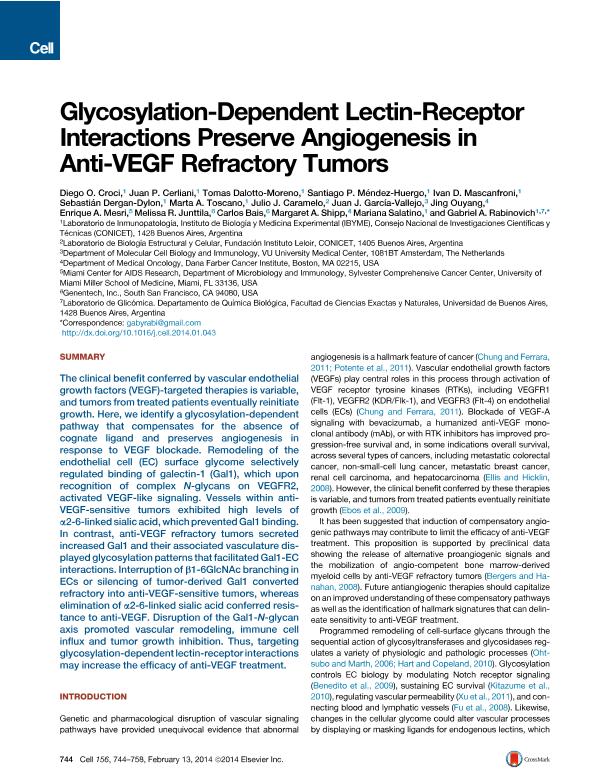Artículo
Glycosylation-dependent lectin-receptor interactions preserve angiogenesis in anti-VEGF refractory tumors
Croci Russo, Diego Omar ; Cerliani, Juan Pablo
; Cerliani, Juan Pablo ; D'alotto Moreno, Tomas
; D'alotto Moreno, Tomas ; Mendez Huergo, Santiago Patricio
; Mendez Huergo, Santiago Patricio ; Mascanfroni, Ivan Darío
; Mascanfroni, Ivan Darío ; Dergan Dylon, Leonardo Sebastian
; Dergan Dylon, Leonardo Sebastian ; Toscano, Marta Alicia
; Toscano, Marta Alicia ; Caramelo, Julio Javier
; Caramelo, Julio Javier ; García Vallejo, Juan Jose; Ouyang, Jing; Mesri, Enrique A.; Junttila, Melissa R.; Bais, Carlos; Shipp, Margaret A.; Salatino, Mariana
; García Vallejo, Juan Jose; Ouyang, Jing; Mesri, Enrique A.; Junttila, Melissa R.; Bais, Carlos; Shipp, Margaret A.; Salatino, Mariana ; Rabinovich, Gabriel Adrián
; Rabinovich, Gabriel Adrián
 ; Cerliani, Juan Pablo
; Cerliani, Juan Pablo ; D'alotto Moreno, Tomas
; D'alotto Moreno, Tomas ; Mendez Huergo, Santiago Patricio
; Mendez Huergo, Santiago Patricio ; Mascanfroni, Ivan Darío
; Mascanfroni, Ivan Darío ; Dergan Dylon, Leonardo Sebastian
; Dergan Dylon, Leonardo Sebastian ; Toscano, Marta Alicia
; Toscano, Marta Alicia ; Caramelo, Julio Javier
; Caramelo, Julio Javier ; García Vallejo, Juan Jose; Ouyang, Jing; Mesri, Enrique A.; Junttila, Melissa R.; Bais, Carlos; Shipp, Margaret A.; Salatino, Mariana
; García Vallejo, Juan Jose; Ouyang, Jing; Mesri, Enrique A.; Junttila, Melissa R.; Bais, Carlos; Shipp, Margaret A.; Salatino, Mariana ; Rabinovich, Gabriel Adrián
; Rabinovich, Gabriel Adrián
Fecha de publicación:
13/02/2014
Editorial:
Cell Press
Revista:
Cell
ISSN:
0092-8674
e-ISSN:
1097-4172
Idioma:
Inglés
Tipo de recurso:
Artículo publicado
Clasificación temática:
Resumen
The clinical benefit conferred by vascular endothelial growth factors (VEGF)-targeted therapies is variable, and tumors from treated patients eventually reinitiate growth. Here, we identify a glycosylation-dependent pathway that compensates for the absence of cognate ligand and preserves angiogenesis in response to VEGF blockade. Remodeling of the endothelial cell (EC) surface glycome selectively regulated binding of galectin-1 (Gal1), which upon recognition of complex N-glycans on VEGFR2, activated VEGF-like signaling. Vessels within anti-VEGF-sensitive tumors exhibited high levels of α2-6-linked sialic acid, which prevented Gal1 binding. In contrast, anti-VEGF refractory tumors secreted increased Gal1 and their associated vasculature displayed glycosylation patterns that facilitated Gal1-EC interactions. Interruption of β1-6GlcNAc branching in ECs or silencing of tumor-derived Gal1 converted refractory into anti-VEGF-sensitive tumors, whereas elimination of α2-6-linked sialic acid conferred resistance to anti-VEGF. Disruption of the Gal1-N-glycan axis promoted vascular remodeling, immune cell influx and tumor growth inhibition. Thus, targeting glycosylation-dependent lectin-receptor interactions may increase the efficacy of anti-VEGF treatment.
Archivos asociados
Licencia
Identificadores
Colecciones
Articulos(IBYME)
Articulos de INST.DE BIOLOGIA Y MEDICINA EXPERIMENTAL (I)
Articulos de INST.DE BIOLOGIA Y MEDICINA EXPERIMENTAL (I)
Articulos(OCA CIUDAD UNIVERSITARIA)
Articulos de OFICINA DE COORDINACION ADMINISTRATIVA CIUDAD UNIVERSITARIA
Articulos de OFICINA DE COORDINACION ADMINISTRATIVA CIUDAD UNIVERSITARIA
Articulos(SEDE CENTRAL)
Articulos de SEDE CENTRAL
Articulos de SEDE CENTRAL
Citación
Croci Russo, Diego Omar; Cerliani, Juan Pablo; D'alotto Moreno, Tomas; Mendez Huergo, Santiago Patricio; Mascanfroni, Ivan Darío; et al.; Glycosylation-dependent lectin-receptor interactions preserve angiogenesis in anti-VEGF refractory tumors; Cell Press; Cell; 156; 4; 13-2-2014; 744-758
Compartir
Altmétricas



